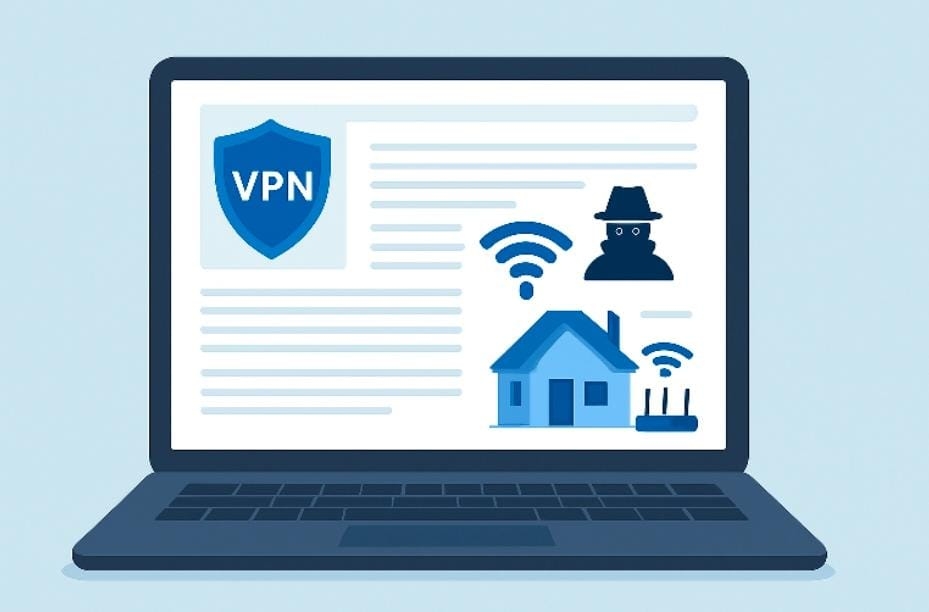PCMag Highlights the Importance of VPNs for Protecting Online Privacy Across Home and Public Networks
By:
AB Newswire
September 01, 2025 at 20:57 PM EDT
In today’s digital world, protecting your online privacy is no longer optional—it’s a necessity. Whether you’re browsing from your home Wi-Fi or using a public hotspot, your personal data is constantly at risk of surveillance, hacking, and theft. One of the most effective tools to secure your digital life is a Virtual Private Network (VPN). By encrypting your traffic, hiding your IP address, and preventing third-party tracking, a VPN ensures your internet activities stay private and secure. The Dangers of Public and Home Networks Public Wi-Fi, while convenient, is one of the riskiest ways to go online. Hackers often set up fake hotspots or exploit unsecured connections to steal sensitive data like login credentials and financial details. Even at home, threats exist:
Without a reliable layer of protection, your data is exposed to multiple risks. How a VPN Works A VPN (Virtual Private Network) creates an encrypted tunnel between your device and the internet. Instead of connecting directly to a website, your traffic is routed through secure servers. This process ensures:
For example, advanced security solutions like VPN services integrated with modern cybersecurity tools offer an additional shield against malware, phishing, and other online threats. The Importance of a VPN on Public Wi-Fi Public Wi-Fi networks are breeding grounds for cyber threats. Without protection, it takes little effort for criminals to intercept unencrypted traffic. A VPN ensures:
As explained in this Forbes guide to VPN security, using a VPN is one of the most effective ways to protect yourself when connecting to public Wi-Fi. Why You Need a VPN at Home While home networks may feel secure, they are far from invincible. Your router could have weak security, and ISPs can legally monitor and profit from your browsing habits. A VPN at home provides:
According to an expert review of the best VPN services, VPNs are no longer a luxury—they are essential for anyone who values privacy. Other Key Benefits of VPN Use
According to a recent guide on privacy vpn internet, using a VPN not only safeguards sensitive data but also enhances digital freedom for users around the world. How to Choose the Best VPN Service When selecting a VPN, make sure it offers:
Free VPNs often compromise your data, so a premium option is the safest investment. Conclusion: A VPN is Essential for Privacy From preventing cybercriminals on public Wi-Fi to protecting your home network from ISP tracking, a VPN is your most powerful shield in today’s online world. It ensures that your browsing, streaming, and communications remain private, secure, and unrestricted. Media Contact More NewsView More
DoorDash’s Recent Stock Dip Equals 60% Upside ↗
Today 12:15 EST
Via MarketBeat
Tickers
DASH

Wall Street Loves Williams-Sonoma Right Now—Here’s Why the Stock Could Soar in 2026 ↗
Today 10:22 EST
Via MarketBeat
Tickers
WSM

Meta Wins FTC Fight, Keeps Instagram Growth Machine Intact ↗
Today 10:17 EST
Via MarketBeat
Tickers
META

Via MarketBeat
Tickers
SBUX

MP Materials Stock Soared After Earnings—Here’s the Real Reason ↗
November 22, 2025
Via MarketBeat
Recent QuotesView More
Stock Quote API & Stock News API supplied by www.cloudquote.io
Quotes delayed at least 20 minutes. By accessing this page, you agree to the Privacy Policy and Terms Of Service.
© 2025 FinancialContent. All rights reserved.
|
